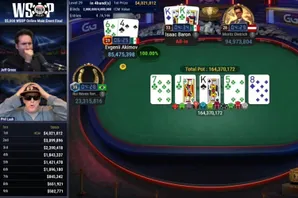The next time you’re about to tell a bad beat story, remember there’s always someone who’s had it worse than you—unless your name is Isaac Baron.
Baron, one of the OG online poker crushers, found himself in an incredible position this week during the 2024 WSOP Online Main Event. With four players left, Baron was primed to take a huge chip lead, and the tournament had the largest first prize in online poker history, with a whopping $4 million at the top. The remaining players were guaranteed $1.8 million, but the stakes couldn’t have been higher.
The Hand That Changed Everything
Baron, holding pocket kings in the small blind, faced an all-in shove from Evgenii Akimov on the button. If Baron called, he would put his tournament life on the line, but if he won, he’d have a dominant stack of 164,370,172 and the chip lead.
Baron made the call, confident in his kings, but Akimov turned over ace of spades and queen of spades—a hand that seemed far less threatening in comparison.
Then came the flop: king of hearts, queen of diamonds, and 10 of spades. Baron was practically a lock for the win, holding nearly 97% equity with top set against Akimov’s overcards and gutshot straight draw.
But poker has a way of throwing curveballs, and the jack of clubs hit on the turn, giving Akimov a straight draw. With only a non-club ace or queen on the river to improve Akimov’s hand, the deck gave him one last chance.
On the river, the queen of clubs arrived, completing Akimov’s straight and sending Isaac Baron out in fourth place with $1,843,337 in prize money.
ICM Value Breakdown
If Baron had won that hand, his ICM (Independent Chip Model) value—essentially the theoretical value of his stack considering the remaining payouts—would have increased from $2,842,477.24 to $3,313,356.69. Instead, Baron walked away with $1.8M, a significant payout but a far cry from the $4M that awaited the winner.
This dramatic hand has poker players and analysts alike discussing the strategy behind the plays. Michael Acevedo, a GTO wizard and author of Modern Poker Theory, broke down the hand, touching on the key strategic elements and ICM implications.
The Shove vs. Min-Raise Debate
Both Acevedo and Dara O’Kearney weighed in on the decision to shove versus min-raise on the button.
-
Akimov’s Shove: Acevedo highlighted that, while Akimov’s all-in shove could be profitable, especially considering the ICM pressure on the other players, it’s not the optimal strategy. Akimov could profitably shove almost any two cards, but he would have been better off using a min-raise strategy, which allows him to play 100% of his hands without relying on the poker gods when he gets called by strong hands like pocket kings.
-
Baron’s Call: As for Baron, calling with pocket kings was the right move from a GTO perspective. KK has strong equity in almost every spot, especially when it’s against a wide range like Akimov’s. Baron was priced in to call with his kings, and it offered a $202,273 equity boost, making it an easy decision.
What Would You Do?
Now, let’s put yourself at the final table in Isaac Baron’s seat. You’re in the small blind, facing a huge decision. Do you call with your kings, risking your tournament life, or do you fold to preserve your stack and take your shot later?
Here are some things to consider:
-
You’re guaranteed $1.8M if you fold, but calling could give you the chip lead and a shot at $4M.
-
You know your opponent’s range is wide, and your kings are in excellent shape against most hands, but the potential for a suck-out is always present.
-
At a final table with millions on the line, the decision to call with a hand like pocket kings isn’t just about the math; it’s about how much risk you’re willing to take to go for the big win.
Would you fold for the safety of a $1.8M payday, or would you risk it all for the chance at $4M? Would you play to win or play it safe?
Poker is a game of decision-making, and sometimes, even the best players can run into the worst bad beats. Isaac Baron’s story in this hand is a perfect example of how quickly the tide can turn, but it also serves as a reminder that, in poker, anything can happen at any time.












